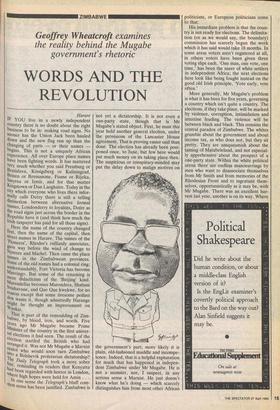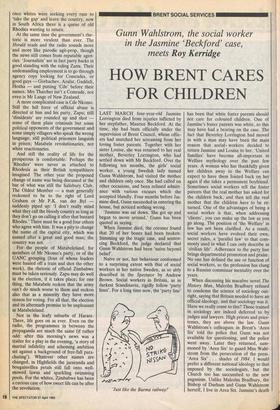ZIMBABWE Geoffrey Wheatcroft examines
the reality behind the Mugabe government's rhetoric
WORDS AND THE REVOLUTION
Harare IF YOU live in a newly independent country there is no doubt about the right business to be in: making road signs. No sooner has the Union Jack been hauled down and the new flag run up than the changing of parts — or their names begins. This is not a uniquely African experience. All over Europe place names have been fighting words. It has mattered Very much whether you said Pressburg or Bratislava, Konigsberg or Kaliningrad, Brixen or Bressanone, Fiume or Rijeka, Smyrna or Izmir, and for that matter Kingstown or Dun Laoghaire. Today in the City which everyone who lives there infor- mally calls Derry there is still a telling distinction between alternative formal names, Londonderry to loyalists, Doire as the road signs just across the border in the Republic have it (and think how much the Irish taxpayer has paid for all those signs). Here the name of the country changed first, then the name of the capital, then street names in Harare. The names of the Pioneers', Rhodes's ruffianly associates, gave way before the wind of change to Nyerere and Machel. Then came the place names in the Zimbabwean provinces. Some of the old names had a colonial ring; understandably, Fort Victoria has become Masvingo. But some of the renaming is ..luere didacticism of the 'Beijing' kind. Marendellas becomes Marondera, Shabani Svishavane, and Que Que kwekwe, for no reason except that some tiresome pedant d°11 wants it, though admittedly Harange
might be thought an improvement on Wankie,
k That is part of the remoulding of Zim- babwe, by blood, iron, and words. Five Years ago Mr Mugabe became Prime Minister of the country in the first univer- sal elections it had seen. The result of the election startled the British who had arranged it. Was not Mr Mugabe a Marxist
ealot who would soon turn Zimbabwe
into a Bolshevik proletarian dictatorship? The Daily Telegraph took a more sober ,1111, e, reminding its readers that Kenyatta :lad been regarded with horror in London, "here high hopes were held for Amin . . .
In one sense the Telegraph's bluff com- mon sense has been justified. Zimbabwe is not yet a dictatorship. It is not even a one-party state, though that is Mr Mugabe's stated object. First, he must this year hold another general election, under the provisions of the Lancaster House agreement. That is proving easier said than done. The election has already been post. ' poned once, to June, but few here would put much money on its taking place them The suspicious or conspiracy-minded may put the delay down to malign motives on the government's part; more likely it is plain, old-fashioned muddle and incompe- tence. Indeed, that is a helpful explanation for much that has happened in indepen- dent Zimbabwe under Mr Mugabe. He is not a monster, nor, I suspect, in any serious sense a Marxist. He just doesn't know what he's doing — which scarcely distinguishes him from most other African politicians, or European politicians come to that.
His immediate problem is that the coun- try is not ready for elections. The delimita- tion (or as we would say, the boundary) commission has scarcely begun the work which it has said would take 18 months. In some areas voters aren't registered at all, in others voters have been given three voting slips each. 'One man, one vote, one time,' has been the sneer of white settlers in independent Africa; the next elections here look like being fought instead on the good old Irish principle, 'Vote early, vote often.'
More generally, Mr Mugabe's problem is what it has been for five years, governing a country which isn't quite a country. The elections, if they take place, will be marked by violence, corruption, intimidation and intestine feuding. The violence will be between black and black. This remains the central paradox of Zimbabwe. The whites grumble about the government and about income tax, as who does not, but they sit pretty. They are unsqueamish about the taming of Matabeleland, and not especial- ly apprehensive about the prospect of a one-party state. Within the white political arena there are endless manoeuvrings by men who want to disassociate themselves from Mr Smith and from memories of the Rhodesian Front and to ingratiate them- selves, opportunistically as it may be, with Mr Mugabe. There was an excellent har- vest last year, another is on its way. Where once whites were seeking every ruse to 'take the gap' and leave the country, now in South Africa there is a queue of old Rhodies wanting to return.
At the same time the government's rhe- toric is more virulent than ever. The Herald reads and the radio sounds more and more like parodic agit-prop, though the news still comes from reputable agen- cies. 'Journalists' are in fact party hacks in good standing with the ruling Zanu. Their undemanding employment is to go through agency copy looking for Comrades, or good guys — Gorbachev, Arafat, Gaddafi, Hoxha — and putting `Cde' before their names. Mrs Thatcher isn't a Comrade, nor even is Mr Lange of New Zealand.
A more complicated case is Cde Nkomo. Still the full force of official abuse is directed at him and his party, Zapu; still 'dissidents' are rounded up and shot some of them plain criminals but some political opponents of the government and' some simply villagers who speak the wrong language; still political prisoners languish in prison; Matabele revolutionaries, not white reactionaries.
And still the reality of life for the prosperous is comfortable. Perhaps the `Rhodies' were never as attached to Rhodesia as their British sympathisers imagined. The other year the proposed change of name was being discussed at the bar of what was still the Salisbury Club. The Oldest Member — a man generally reckoned to be to the right of Lord Graham or Mr P.K. van der Byl suddenly piped up: 'I don't really mind what they call the bloody country as long as they don't go on calling it after that bastard Rhodes.' There must be a good four others who agree with him. It was a pity to change the name of the capital city, which was named after a great and good man; the country was not.
For the people of Matabeleland, for members of Mr Nkomo's party, or of the UANC grouping (four of whose leaders were hauled off a train and shot the other week), the rhetoric of official Zimbabwe must be taken seriously. Zapu may do well in the election, if it takes place; for one thing, the Matabele reckon that the army can't do much worse to them and reckon also that as a minority they have more reason for voting. For all that, the election and its aftermath promise to be unpleasant in Matabeleland.
Not in the leafy suburbs of Harare.
There, life goes on as ever. Even on the radio, the programmes in between the propaganda are much the same (if rather odd: after this morning's news was a trailer for a play in the evening, 'a story of marital infidelity and scheming ambition set against a background of free-fall para- chuting'). Whatever other names are changed, in Highfields the jacaranda and bougainvillea petals still fall onto well- mowed lawns and sparkling swimming pools. For the whites, Zimbabwe has been a curious case of how sweet life can be after the revolution.



















































 Previous page
Previous page